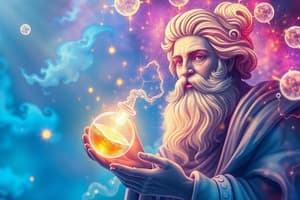Podcast
Questions and Answers
Which of the following represents the four primal elements as proposed by Empedocles?
Which of the following represents the four primal elements as proposed by Empedocles?
- Fire, Air, Water, Earth (correct)
- Wind, Ice, Earth, Fire
- Fire, Lightning, Water, Soil
- Water, Steam, Dust, Fire
What is the significance of Empedocles' theory on the four primal elements?
What is the significance of Empedocles' theory on the four primal elements?
- It lays the groundwork for later scientific theories of elements. (correct)
- It suggests that elements can transform into each other directly.
- It introduces a dualistic approach to matter.
- It emphasizes the role of gravity in elemental interaction.
Which statement best captures the essence of Empedocles' belief about the primal elements?
Which statement best captures the essence of Empedocles' belief about the primal elements?
- They are the building blocks of all matter. (correct)
- They exist only in isolation and serve no combined purpose.
- They are interchangeable under all circumstances.
- They are fundamentally different and cannot interact.
Which of the following elements is NOT one of the four primal elements proposed by Empedocles?
Which of the following elements is NOT one of the four primal elements proposed by Empedocles?
How did Empedocles contribute to the understanding of nature through his theory of primal elements?
How did Empedocles contribute to the understanding of nature through his theory of primal elements?
Flashcards
Who was Empedocles?
Who was Empedocles?
Empedocles was a pre-Socratic Greek philosopher who proposed that all matter is composed of four fundamental elements: fire, air, water, and earth.
What are the four primal elements proposed by Empedocles?
What are the four primal elements proposed by Empedocles?
Fire, air, water, and earth are the four basic elements that Empedocles believed made up everything in the universe.
How do the four elements interact according to Empedocles?
How do the four elements interact according to Empedocles?
Empedocles proposed that the four primal elements interact through two forces: love and strife. Love brings the elements together, forming complex objects, while strife separates them, leading to destruction and change.
What is the significance of Empedocles' theory?
What is the significance of Empedocles' theory?
Signup and view all the flashcards
Why is Empedocles notable?
Why is Empedocles notable?
Signup and view all the flashcards
Study Notes
Empedocles' Four Primal Elements
- Empedocles, an ancient Greek philosopher and pre-Socratic thinker, is credited with proposing the theory of the four primal elements—fire, air, water, and earth.
- His theory posited that these four elements were fundamental constituents of all matter in the universe.
- The concept that everything is composed of these four elements influenced later Western thought significantly.
Nature of the Elements
- Empedocles believed that different combinations of these four elements constituted various substances.
- He argued that they were not statically defined entities. He thought their characteristics could shift and fluctuate.
- It is crucial to note that Empedocles' understanding of these elements differed fundamentally from the modern scientific understanding of atoms and molecules.
- His concept was more descriptive/philosophical, focusing on general properties than on the exact physical composition.
Forces Driving Change
- Empedocles didn't just present static elements; he proposed two fundamental forces that interacted with these primal elements: Love and Strife.
- Love was a unifying force, causing the elements to mix and create compounds.
- Strife, conversely, was a separative force, causing the elements to separate and form distinct materials.
- He suggested that Love and Strife alternately dominated, causing cycles of combination and separation, explaining the constant change in the universe.
Implications and Influence
- Empedocles' theory provided a framework for understanding the natural world based on fundamental principles.
- The theory laid the groundwork for later atomic theories and ideas of how the universe changed, moving beyond a focus on a single primordial substance into more complex compositions.
- His theory influenced diverse fields, including medicine, chemistry, and even aspects of art and literature, demonstrating a lasting impression across various disciplines.
- It is still a remarkable example of early scientific/philosophical thought about the composition of matter.
- This theory significantly impacted the development of early cosmological and scientific thought in ancient Greece.
Studying That Suits You
Use AI to generate personalized quizzes and flashcards to suit your learning preferences.




